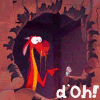
After talking to some artists who haven’t started producing anything yet, I wanted to write this post for those of you who are stuck. I’m going to tell you a secret. You already know why you’re not writing or drawing or painting or making music or whatever your flavor of art is. You really, really do. Discipline is required, but to sit down and actually make art? There’s a reason why you’re not doing it, and you know what that is. If you don’t, you’re having a hard time admitting that horrifying and terrible truth to yourself.
Often, the reason why you’re not making art is grounded in what you’re feeling. Most of the time, it’s because you’re afraid. I’m not talking fire-and-brimstone fear, I’m talking about the kind of skepticism, anxiety, and existential dread that evolves out of knowing what you want to do, picturing it clear in your mind, and not being able to draw/paint/write like you do in your head. Consider these types of artists:
- SCENARIO A: THIS SHOULD BE EASIER THAN IT ACTUALLY IS – Some artists feel inept, broken, disconnected. So, they run to the bookstore or visit websites where they’re promised “the secret of…” and a hundred tips to hone and perfect their art–all things they are grateful to learn, of course–and they sit back down apply tips here and there expecting their unformed work will match their imagined masterpiece. They bought the secret, after all. Only, their finished work doesn’t match their vision no matter how hard they try. They feel defeated, they set their art aside, and rinse/repeat at a later date.
SCENARIO B: I SUCK, BECAUSE I KNOW WHAT I CAN’T DO – Other artists are so painfully aware of what they don’t know, and they constantly berate themselves for it. They might even know a bunch of artists, and hang with them hoping some of their talent will rub off. They try as time allows, but have so little confidence in the process of learning how to make the art they want they never finish what they’re working on. Unfocused and lost, they flip to many different mediums or constantly change what it is they want to do.
SCENARIO C: EVERYTHING I DO IS FINISHED AND READY TO SELL – Some artists either don’t care about what they don’t know or doesn’t care about what they can’t/shouldn’t do. As soon as their work is finished, they offer it for sale or for public review. Friends, family, reviewers, and folks within a community of artists like this could be encouraging them to publish or share the art before its ready, because they think they’re helping and it feels good. But, because nothing is held back these artists are not protecting the work they do, and their ability to improve is hampered. It’s exactly the opposite: they’re sharing it at every stage and use other people’s opinions as a guide instead of trusting that learning is a process we all go through.
There are many, many different scenarios of artists like these who are trying to connect what they want to do, with what they think they’re doing, and what they actually know how to do. Most of us make up our careers as we go along, because there are many things outside of our control. A career happens, however, after artists have the ability to continually produce art to sell. When you’re just starting out, you’re not there quite yet–and that’s okay. That’s normal. The vehicle of commercialism, social media, and other means of sharing, selling, and getting feedback on your art exacerbates feelings and adds an extra layer of fuckery and/or angst as well. Only, selling and promoting your art is a process, and it’s not the same process required to make it.
Again, I want to reinforce that you know why you’re not making art, and that reason is usually connected to your emotions. Do your circumstances affect your ability to make art? Absolutely, and I’m not writing this post to diminish your situation because only you know what that is. Discipline is what has helped me to work past my own issues, and it’s part of making art. That discipline came from the years I practiced and performed as a musician, and it’s something I applied to writing and jewelry making. It’s not the same process as selling your art, revising it, reviewing it, promoting it, etc. but it’s the most crucial–because there is no secret to becoming an artist. First, you have to get in the habit of making art before you can do anything else.
If you don’t know how to make art you want to make, be kind to yourself. Give yourself the time and the ability to learn. Make mistakes. Study. Ask questions. By all means, take risks and screw up–but do it on your terms. Without that piece, without the crucial processes and methods you internalize by making art and finishing what you’ve started, then all you’re left with is hopes and dreams which, if you’re not careful, can leave you bitter. You’re also not alone, however, and I hope that this post encourages you to face up to your feelings, push past them, and start making art because it’s what you really want to do.
- Mood: It’s Monday.
Caffeinated Beverages Consumed: Yeah, it’s bad.
Work-Out Minutes Logged Yesterday: I walked. Outside even!
In My Ears: Hercules for some brain candy.
Game Last Played: Dragon Age: Inquisition
Book Last Read: Research materials for work.
Movie/TV Show Last Viewed: Hercules
Latest Artistic Project: Make Art Not War 2017 Challenge and Rules
Latest Releases: Read my end-of-the-year list of releases for an overview of what I’ve put out for 2016. Check out Upside Down: Inverted Tropes in Storytelling and, if you like it, consider leaving a review.
Current State of Projects: Read my latest project update.


